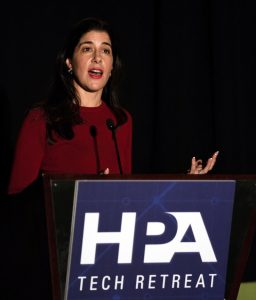HPA Tech Retreat Offers Deep Look at Current — and Future — State of Esports Market
SVG collaborated with HPA on opening-day TR-X event focused on esports
Story Highlights
Kicking off the 2019 HPA Tech Retreat on Monday, the annual HPA TR-X event was dedicated to the rapidly growing esports sector. As part of the TR-X festivities at the JW Marriott Desert Springs Resort in Palm Desert, CA, SVG partnered with the HPA to produce a pair of sessions: “Esports Pipeline of the Future” and “Are You Ready for the Challenge?”
Chaired by Mobile TV Group Director, Business Development, Mark Chiolis and Amazon Web Services Senior Consultant, M&E Professional Services, Craig German, TR-X brought together industry leaders to discuss how videogame publishers, esports leagues, esports venues, and live-streaming services are transforming live sports production.
Keynote: ESL’s Martinez Stresses Complexity of Esports Production
In an opening keynote presentation, ESL North America CEO Yvette Martinez detailed how the esports organizer/producer became the world’s largest esports company and offered a comprehensive overview of the entire esports ecosystem. She spoke to the broad spectrum of esports events — from 1v1 to 5v5 to battle royale with hundreds of players — and the challenges created on the production side.

Keynote presenter ESL’s Yvette Martinez: “[With esports,] we are dealing with multiple different sports within a sport. Every single game is a dramatically different community of fans.”
“You have to serve each of these different communities very differently,” she continued. “Putting on a Hearthstone tournament — a card game — is very different from putting on a [Player Unknown’s Battlegrounds] tournament, where you have 100 players in the room. That is the complexity that we face, not only from a production perspective. How do you market and deliver the content? How do you speak to the fan and serve their needs? It gets very complicated very quickly.”
Digging Deeper: Toughest Operational and Technical Challenges
“Esports Pipeline of the Future” and “Are You Ready for the Challenge?” — companion panels co-produced by HPA and SVG and moderated by SVG Chief Editor Jason Dachman — addressed both the greatest operational and technical challenges and opportunities facing live–esports-production entities today.

“The Esports Pipeline of the Future” panel: (from left) SVG’s Jason Dachman, Turner Sports’ Tom Sahara, Riot Games’ Mitch Rosenthal, Simplynew’s Marc Scarpa, and Gearhouse Broadcast’s Marc Genin
First, in “Esports Pipeline of the Future: Could Esports Unseat America’s Biggest Sports Event?,” top-ranked esports-operations executives discussed today’s live-production workflows and how they are evolving. The panel featured organizations representing different pieces of the esports-production ecosystem: esports broadcaster Turner Sports (which operates ELEAGUE events), game publisher Riot Sports (which operates the League of Legends Championship Series), esports-venue specialist Simplynew (which served as media-solutions integrator for Esports Stadium Arlington in Texas), and remote-production–facilities provider Gearhouse Broadcast (which has provided trucks and equipment for dozens of esports events). On the panel were Tom Sahara, VP, operations and technology, Turner Sports (and SVG Advisory Board Chairman); Mitch Rosenthal, head of production and operations, Riot Games; Marc Scarpa, co-founder, Simplynew; and Marc Genin, managing director, Gearhouse Broadcast.

“Are You Ready for the Challenge?” panel: (from left) SVG’s Jason Dachman, Riot Games’ Ray Panahon, LJK Consult’s Lowell Kay, ESL’s Mike Ulaky, and esports-production veteran Shawn Hendrix
The more technology-focused “Are You Ready for the Challenge?” panel provided an insider’s look at the next-gen technologies being used today for esports productions and those currently in development. Workflows and infrastructure were outlined by Riot Games Technical Lead Ray Panahon, discussing the League of Legends Championship Series, and by ESL Senior Solutions Engineer Mike Ulaky, covering dozens of productions across North America. In addition, Shawn Hendrix, a two-decade veteran of the esports-production industry, detailed how live workflows have evolved and the tools he’s using to produce events today. And LJK Consult’s Lowell Kay, who led technical integration for the recently opened Esports Stadium Arlington, provided a behind-the-scenes look at the technology inside North America’s largest esports venue.
More From TR-X: Beat the Clock, Technical Enablement, Collegiate Esports
In addition, TR-X offered a pair of “Beat the Clock” sessions, which provided five speakers 2½ minutes apiece to address key issues facing the esports industry: Sahara, CBT Systems’ Darrell Wenhardt, Artistic Resources Corp.’s Michael Little, Unity’s Adam Myhill, and UCLA’s Center for Media, Entertainment & Sports’ Jay Tucker.
A session titled “The Metal Behind the Medal” focused on the technical enablement required to create esports-production workflows and featured Dell EMC’s Thomas Burns, Microsoft’s Eliot Sakhartov, industry expert Josh Rizzo, and Myhill.
With a growing number of top universities and colleges establishing esports programs, TR-X also offered a session addressing the esports curriculum of the future, featuring Yellowpike Media’s Dakota Maysonet, USC’s Keanu Concepcion and Arnold Ha, and UCLA’s Tucker.
The 2019 HPA Tech Retreat runs Feb. 11-15 at the JW Marriott Desert Springs Resort in Palm Desert, CA.
